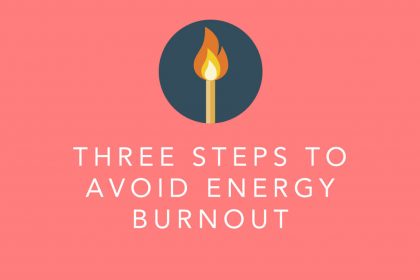The very real experience of career burnout – what it is and what to look out for
We all have days in our working lives where we just can’t seem to get motivated. Perhaps you feel irritable, over-tried, anxious or reluctant to engage with colleagues and clients.
It’s good to know that this experience is completely normal. Especially if you’re in a senior role, running your own business, in the process of setting up your own business, or generally have quite a full-on work load.
It’s so easy to get stuck on a one track frame of mind and focus on the go-go-goof doing everything. Sometimes these feelings are simply our mind and body’s way of letting us know to take a day or two out to re-focus.
But it could also be the start of something deeper. If you find you’re going through long stretches of these feelings with no reprieve, or they’re escalating to other symptoms such as lack of sleep, loss of appetite, or consistent low mood, you could be experiencing career burnout.
Career burnout is a distinct form of chronic job stress that leads to a continued state of physical, emotional and mental exhaustion. This could be combined with negative feelings and thoughts about your competence at work, your ability to achieve goals, and the value that you bring to your workplace.
What triggers career burnout?
Career burnout can actually be a useful experience. It can indicate if you’re being undervalued, underutilised and under appreciated in your current workplace, and that it may be time for you to seek something new.
Other triggers for career burnout can include:
- Feeling under-resourced.
- Feeling inadequately qualified or skilled.
- Unreasonable or unpleasant management or co-workers.
So, what can you do help combat career burnout?
As with most things in life, prevention is better than the cure, so it’s worthwhile investing a bit of time exploring if any of your current feelings of stress at work are just part and parcel of your job, or leading to something more.
Evaluate how long and how often you have these feelings. Keep a work diary of stressors so you can start to build a more conscious idea of what’s happening in your work life and how it’s having an impact on you. Then you need to:
1) Identify the source of your stress and/or trigger
Once you have a better idea of what is actually causing you to feel burnout, you can take positive steps to addressing and correcting it. If you find that every Friday is a haze of anxiety, stress and pressure – really think about what’s causing it. Is there a client or colleague you have to deal with on that day that pushes your buttons? Do you have more commitments you have to undertake at home that topples your capacity? Do you have a regular team meeting you always feel unprepared for?
These are all great insights to help you move onto step two.
2) Find ways to get help
Some things will be easier to address than others. If a particularly client is giving you grief, find out what you need to do to close the relationship. Finish the project, get to the end of the contract, or find someone to take over for you; the best thing about freelance is that you do get a say in who you work with and if the relationship is toxic, you can move on quite freely and professionally.
Finding a trusted mentor, supervisor, friend or partner who you can open up to will also help. Let whoever you confide in know what you want from speaking with them to – if you just want someone to listen or someone to help you problem solve – so the conversation becomes meaningful and not stressful.
3) Create some boundaries
Draw up a realistic time table of what you can individually commit to and achieve in any given day, week or month – and then stick to it. Start small and add in extra commitments if you can, but don’t put pressure on yourself to add more. Evaluate regularly and make sure you factor in ‘me time’ and family time too.
4) Make sure you do you
Call it instincts, gut feelings, intuition – whatever your choice of words, we usually all know deep down when something isn’t right for us. If after three months of evaluating, setting boundaries or ‘me time’, work is still getting you down, you need to make sure you do right by yourself.
Maybe this isn’t the right path for you to be on, and there’s no shame in admitting that and making the positive changes that you need to make.
You do you.
Stress is a natural part of the workplace. We’re all human after all. But there’s a distinct difference between feeling pressured because of a one-off large deadline, or consistent feelings of dread when you walk into the office.
Take our career audit
Don’t let career burnout get to the point where it’s damaging you. Take control, take stock of what’s happening and seek appropriate help and support to get you to the place you want to be; feeling positive about your career.
And if you’re unhappy with your current career or job, or worried you’re burning out, take our career audit and discover what you’re good at doing, what you love doing, and set yourself achievable tasks to help you find a direction or job that is perfectly ‘you’.
Elaine Mead is a passionate education and careers consultant, and is particularly interested in empowering young women to be their professional best. You can follow her on Twitter and read more of her articles on medium.
Photo by Frank Busch










